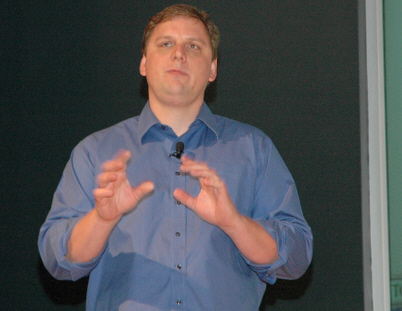Gnomedex: Web 2.0 is not an echochamber

Mike Arrington of TechCrunch, which chronicles the parade of Web 2.0 products and services, chaired the first Gnomedex session of the day, proclaiming that Web 2.0 is not just an echochamber. He gave the example of Digg, which he said is getting to the size of the New York Times. YouTube and MySpace are other examples of startups that have achieved scale and reach mainstream audiences.
Steve Rubel suggested that the upstarts can't get the ads and need to find the strong arms of a bigger company to scale revenue. Arrington countered that advertising is booming and the upstarts have a low burn rate. "YouTube iterated quickly, with tags, user ratings and innovated quickly and beat the crap out of everybody," Dave McClure said during the conversation. "You can create companies with massive impact across a broad audience with a few people....The challenge for companies getting lots of users is how to monetize beyond advertisements."
Arrington defined success as making money and makng the Interent a better place to hang out...like Digg.
Of course, the vast majority of startups will fail to succeed, mostly because they can't make money because they don't make the Internet that much of a better place than what already exists.
Mike Arrington: Web 2.0 is spawning winning companies
Mitch Ratcliffe ranted that the failure to protect Net neutraility could hurt startups. The carriers could decide that some startups are a wasteful use of bandwidth, just because they are beginning to succeed, putting a damper on entreprenuership, he said. Kathy Gill, of the University of Washingon, said that if network neutrality were called network discriimination, more people would pay attention to the issue.
Arrington was asked if Web 2.0 is like the previous generation that went bust. "Things are incredibly different," Arrington said. "Companies are not going public. You could get bought for $25 million and aren't getting bought for $10 billion. Edgeio [Arrington was a co-founded and is now a board member] was launched for $75,000. We would have spend $10 million in 1998."